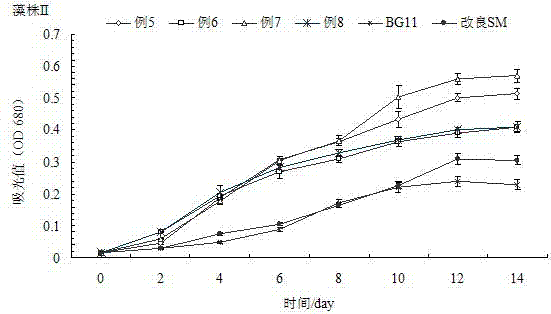Haematococcus pluvialis culture medium
A technology of Haematococcus pluvialis and culture medium, applied in the direction of microorganisms, single-cell algae, and methods based on microorganisms, can solve the research on the effect of organic phosphorus sources on the growth of Haematococcus, and does not regulate the growth of Haematococcus cells. Growth and other problems, to shorten the growth cycle, increase the probability of success, increase the effect of yield
- Summary
- Abstract
- Description
- Claims
- Application Information
AI Technical Summary
Problems solved by technology
Method used
Image
Examples
Embodiment 1
[0040] (1) Each liter of medium contains
[0041] NaNO 3 0.32 g, KNO 3 0.17 g, MgSO 4 ·7H 2 O 0.07g, Na 2 SO 3 0.032g, C 6 h 5 Na 3 o 7 0.11 g, KH 2 PO 40.02 g, G-P 0.015 g, CaCl 2 0.03 g, EDTANaFe 0.0002 g, FeSO 4 0.001 g, ZnSO 4 0.0015 g, MnCl 2 0.00006 g, CoCl 2 0.00003 g, H 3 BO 3 0.0001 g, CuSO 4 0.00006 g, (NH 4 )Mo 7 o 24 0.00002 g, 3-IBA 0.002 g, 6-BA 0.0003 g, Vb 12 0.000025~0.00005 g.
[0042] (2) Add 100 mL of the medium shown above in a 250 mL Erlenmeyer flask, the inoculation ratio is 10% (that is, the volume of the seed liquid accounts for 10% of the culture volume), and the seeds are Haematococcus strain I in the logarithmic growth phase , the inoculation density was 10 3 ~10 4 cells / mL. The culture temperature was (23 ± 1.5) °C, the culture light intensity was 1300-1500 lx, and the culture room was continuously illuminated for static culture. During this period, the culture was shaken several times a day, and three replica...
Embodiment 2
[0047] (1) Each liter of medium contains
[0048] NaNO 3 0.35 g, KNO 3 0.15 g, MgSO 4 ·7H 2 O 0.14 g, Na 2 SO 3 0.05 g, C 6 h 5 Na 3 o 7 0.20 g, KH 2 PO 4 0.02 g, G-P 0.010 g, CaCl 2 0.06 g, EDTANaFe 0.00025 g, FeSO 4 0.002 g, ZnSO 4 0.0030 g, MnCl 2 0.00012 g, CoCl 2 0.00007 g, H 3 BO 3 0.0002 g, CuSO 4 0.00012 g, (NH 4 )Mo 7 o 24 0.00004 g, 3-IBA 0.002 g, 6-BA 0.0003 g, Vb 12 0.000025~0.00005 g.
[0049] (2) Add 100 mL of the medium shown above in a 250 mL Erlenmeyer flask, the inoculation ratio is 10% (that is, the volume of the seed liquid accounts for 10% of the culture volume), and the seeds are Haematococcus strain I in the logarithmic growth phase , the inoculation density was 10 3 ~10 4 cells / mL. The culture temperature was (23 ± 1.5) °C, the culture light intensity was 1300-1500 lx, and the culture room was continuously illuminated for static culture. During this period, the culture was shaken several times a day, and three rep...
Embodiment 3
[0054] (1) Each liter of medium contains
[0055] NaNO 3 0.34 g, KNO 3 0.16 g, MgSO 4 ·7H 2 O 0.13 g, Na 2 SO 3 0.045 g, C 6 h 5 Na 3 o 7 0.22 g, KH 2 PO 4 0.02 g, G-P 0.02 g, CaCl 2 0.07 g, EDTANaFe 0.00024 g, FeSO 4 0.0018 g, ZnSO 4 0.0024 g, MnCl 2 0.00015 g, CoCl 2 0.00005 g, H 3 BO 3 0.00019 g, CuSO 4 0.00014 g, (NH 4 )Mo 7 o 24 0.00003 g, 3-IBA 0.002 g, 6-BA 0.0003 g, Vb 12 0.000025~0.00005 g.
[0056] (2) Add 100 mL of the medium shown above in a 250 mL Erlenmeyer flask, the inoculation ratio is 10% (that is, the volume of the seed liquid accounts for 10% of the culture volume), and the seeds are Haematococcus strain I in the logarithmic growth phase , the inoculation density was 10 3 ~10 4 cells / mL. The culture temperature was (23 ± 1.5) °C, the culture light intensity was 1300-1500 lx, and the culture room was continuously illuminated for static culture. During this period, the culture was shaken several times a day, and three r...
PUM
 Login to View More
Login to View More Abstract
Description
Claims
Application Information
 Login to View More
Login to View More - R&D
- Intellectual Property
- Life Sciences
- Materials
- Tech Scout
- Unparalleled Data Quality
- Higher Quality Content
- 60% Fewer Hallucinations
Browse by: Latest US Patents, China's latest patents, Technical Efficacy Thesaurus, Application Domain, Technology Topic, Popular Technical Reports.
© 2025 PatSnap. All rights reserved.Legal|Privacy policy|Modern Slavery Act Transparency Statement|Sitemap|About US| Contact US: help@patsnap.com


